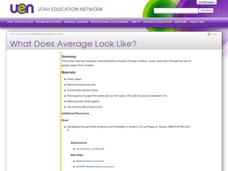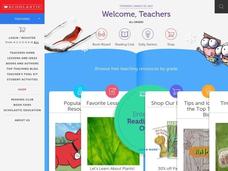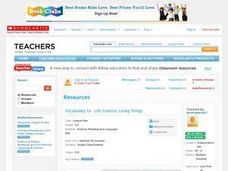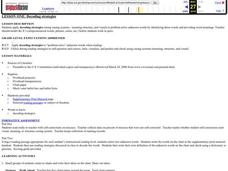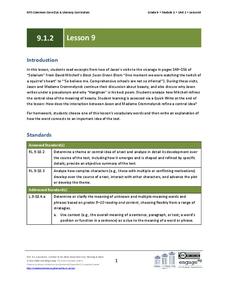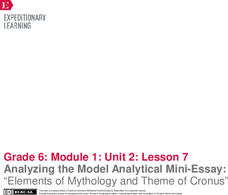Curated OER
Geographically Speaking
Students play a matching game to reinforce the retention of vocabulary words. In this geography lesson, students watch a PowerPoint to define vocabulary words associated with geography, play a memory game with the words, and write an...
Curated OER
Developing Students' Vocabulary Range for Describing People
Middle schoolers develop vocabulary for describing people.
Curated OER
Learning New Words
Students, working in groups, make as many words as possible in a given time, using flash cards that contain prefixes, words, and definitions. They chose group roles and participate in a numbers of time rounds of this activities.
Curated OER
Clam Word Search
For this clam vocabulary worksheet, students recognize words that relate to clams. Students complete the word search by finding all of the nine clam words.
Curated OER
Sight Word Matching
Students explore English by participating in a match game. In this sight word vocabulary lesson, students read the book The Cat's Surprise and identify the sight words which they are unfamiliar with and need to review. Students identify...
Curated OER
Alexander and the Wind-Up Mouse
Pupils explore English by reading a children's book in class. In this story vocabulary lesson, students read the book Alexander and the Wind-Up Mouse and discuss the use of three vocabulary words. Pupils define the selected vocabulary...
Curated OER
Introduce Vocabulary: Chrysanthemum
Young scholars explore language arts by reading a story with their class. In this beginner vocabulary lesson, students read the book Chrysanthemum and discuss the vocabulary used in the story. Young scholars participate in a word play...
Curated OER
Introduce Vocabulary: Make Way for Ducklings
Students raise their hands as they hear new vocabulary words read by the teacher in Make Way for Ducklings. In this vocabulary instructional activity, students continue practicing recognition and usage of new words with teacher prompts.
Curated OER
Decoding Strategies
Students practice using context clues to decode the meanings of unfamiliar words. In this vocabulary skills lesson plan, students follow the provided instructions to complete graphic organizers that enable them to decode words in "The...
Curated OER
Vocabulary of Ancient Rome Grades 9-12)
Students define ancient Roman vocabulary using the dictionary writing sentences.
Curated OER
What Does Average Look Like?
Fifth graders explore the concepts of range, median, mode, and mean through the use of graphs drawn from models. They use manipulatives to represent data they have collected within their groups, and compare the differences between mode,...
Curated OER
Data Scavenger Hunt
Eighth graders discuss how data is collected and participate in data collection through a survey. They complete a scavenger hunt on the Internet to gain understanding of the data measures mean, median, mode, and range.
Curated OER
What's the Weather?
Students explore different types of weather and examine the elements in the sky that create weather. They create a class lift of weather words and examine and discuss a weather poster. Students then complete the "What's the Weather?"...
Curated OER
Vocabulary 1a: Life Science: Living Things
Life science vocabulary comes alive through repeated exposure. With the instructor, words are defined and posted in the classroom. Learners repeat the definitions in their own words and review them often. Extension ideas and links are...
Curated OER
Close Encounters of the World Kind
Explore the vocabulary of the government process. Using a simple technique, learners discuss the meaning of the words majority, election, democrat, republican, and independent. This can be used as an anticipatory set.
Curated OER
Decoding Strategies
Young readers apply decoding strategies to identify unknown words. In this reading lesson plan, they read the Preamble and practice using decoding strategies. Small groups rotate to five charts that have questions regarding the...
Curated OER
Memory Master
Practice spelling words that use prefixes, suffixes, and specific roots. In this grammar lesson plan, learners play a game where they compete with spelling words correctly to gain points. A short set of review questions are also included.
Pearson Longman
Emotions Reading
Explore the many types of feelings and how people express them with a lesson compiled of kid-friendly activities that spark critical thinking, self-reflection, and reinforce language and writing skills. Scholars delve into the variety of...
Maine Content Literacy Project
Introduction to The Lottery, by Shirley Jackson
"The Lottery" by Shirley Jackson is a great story to share with your class, and this lesson focuses on just that story! The eighth in a fourteen-lesson series on short stories, the plan has learners study some vocabulary, read the story,...
EngageNY
Grade 9 ELA Module 1, Unit 2, Lesson 5
How does word choice influence the meaning and tone of a text? To answer this question, class members listen to a masterful reading of a passage from David Mitchell's Black Swan Green and then work with a partner to conduct a close...
EngageNY
Grade 9 ELA Module 1, Unit 2, Lesson 9
Class members continue their discussion of David Mitchell's Black Swan Green, focusing on how the author uses the conversation between Jason and Madame Crommelynck to refine his central idea of the meaning of beauty.
EngageNY
Grade 10 ELA Module 4: Unit 2, Lesson 7
One sentence, so much meaning. Scholars analyze a quote from Act 2.3 of Shakespeare's Macbeth and explore the plot in a jigsaw discussion.
EngageNY
Launching A Midsummer Night’s Dream: The Universal Appeal of Shakespeare, Part 2
As scholars prepare to read Shakespeare's A Midsummer Night's Dream, they first read the article "Shakespeare's Universal Appeal Examined" and analyze its central idea. Next, pupils complete Frayer Model worksheets to understand better...
EngageNY
Analyzing the Model Analytical Mini-Essay: “Elements of Mythology and Theme of Cronus”
It's time to make a claim. Scholars learn what it means to make a claim by first looking at a model analytical mini-essay to determine how the author relayed ideas. Pupils then work with partners to discuss how the author might have...












